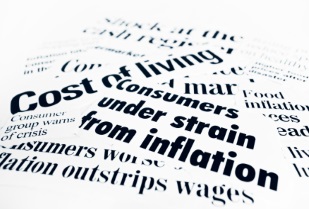The destructive power of inflation
 Einstein is reputed to have said that compound interest is the most powerful force in the universe. He could equally well have said that inflation is the most destructive.
Einstein is reputed to have said that compound interest is the most powerful force in the universe. He could equally well have said that inflation is the most destructive.
Oil up 15%, bread 4.9%, coffee 9%, VAT 2.5% these are a few of the price rise that have recently made the headlines. The floods in Queensland have sparked warnings of disruption to sugar production and extreme weather in the Ukraine and Argentina is driving up the price of wheat.
This is inflation out in the open, it stares you in the face every time you fill up the car with petrol, it’s talked about in the news and it’s all over the papers. Generally speaking though we tend not to notice inflation; when you are working and earning a living you are to some extent carried along on an inflationary tide as over time your wages more or less rise along with it.In fact if you have managed to scramble onto the property ladder by taking out an enormous mortgage you might even welcome it. In the long run inflation will make your debt more affordable and your property appear to be worth more. Inflation can be as favourable to borrowers as it is destructive to savers.
Devaluing your savings
But whether you notice it or not, inflation is insidiously eroding away at your savings. In better economic times there would be a host of accounts paying sufficient interest to more than compensate for this, but now there is only a handful.
According to the Bank of England the average instant access account is currently paying 0.23%. If inflation is allowed to carry on as it is, the value of savings in these accounts will be devastated over the next few years.
With CPI inflation over the last year of 3.7%; £1,000 in one of these accounts will have earned the saver £2.30 in interest, of which the Government will have claimed 46 pence in tax if they are a standard rate tax payer, double or more for higher rate. But the £1,000 itself will have lost a massive £37 in buying power because of how much prices have increased resulting in a net loss of £34.70.
The tax on the savings interest may not be much, but to quote David Gauke, Exchequer Secretary to the Treasury, when challenged on this issue, “The capital itself (the savings) is not taxed” so I suppose we have something to be grateful for.
The elderly have it worst
The real impact of inflation may not hit home until you retire and your income is dependent on your savings or pension annuity. Let’s take an imaginary pensioner; Jack retired at 65 back in back in 1994. He used his £30,000 of pension savings to buy an annuity that would pay him £3,400 a year, every year, for the rest of his life. He thought that with this on top of his state pension he could maintain a reasonable standard of living. But fifteen years later, Jack is 80 and his £3,400 buys roughly half of what it did when he retired.
According to the Bank of England’s inflation calculator, inflation rose by an average of 2.6% a year between 1994 and 2009; this may not seem much but even so what he could have bought for £3,400 back in 1994 would now cost him £5,042.
The reality of the situation is almost certainly even worse since as you get older your spending patterns change. Inflation tends to hit the elderly harder and this has prompted Age UK to publish its Silver RPI, which shows that someone aged over 75 experiences inflation over 4% greater than it affects the average person.
Double whammy
The problem for pensioners is compounded even further by low annuity rates. Moneyfacts recently reported that “Over the past 16 years, a combination of falling gilt yields and improving mortality rates has seen rates drop by a massive 46% for males and 43% for females.” So if Jack was 65 today, his £30,000 pension pot would only get an annuity of £1,875 a year.
Conflict of policies
As people are living longer the amount they need to save in order to be able to provide an income to last them for the rest of their lives is increasing. On top of this, from student fees to care for the elderly, ever greater onus is being put on us to provide for ourselves.
The pressure to save is on, but those who have saved are being penalised for it. As long as the rewards for not saving outweigh the rewards for saving, Government social policy will continue to be undermined by its economic policy.















